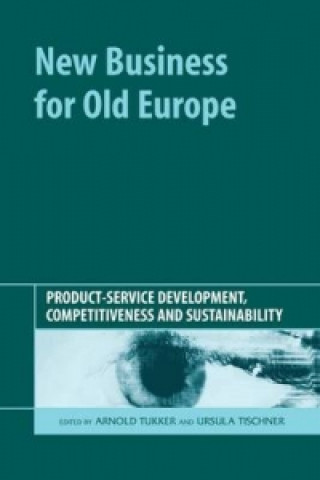
Consegna
Guida all'acquisto





Non ti piace? Non importa! Puoi restituircelo entro 30 giorni
 Buono sconto
Di qualsiasi valore
Buono sconto
Di qualsiasi valore
Non puoi sbagliarti con un buono regalo. Con il buono regalo, il destinatario può scegliere qualsiasi prodotto della nostra offerta.
New Business for Old Europe
 Inglese
Inglese
 252 b
252 b
30 giorni per il reso
Potrebbe interessarti anche


Selling products used to be the standard way of doing business. Traditionally, it is left to the user to transform the purchase of a product into something that fulfils effectively a final-user need. Today, two streams of research - business management and sustainability - normally with very distinct perspectives on the world, have surprisingly converged to form a common conclusion: selling products is old-fashioned business. Companies should switch their focus to selling need fulfilment, satisfaction, or experiences. Or, in other words, selling integrated solutions or product-services. The business management literature argues that, by focusing on the integrated, final-client needs, and delivering integrated solutions fulfilling these needs, companies will be able to improve their position in the value chain, enhance added value of their offering, and improve their innovation potential. In a business world where many products are becoming equally well-performing commodities, this strategy is one of the ways to avoid a sheer competition on price - a type of competition that Europe never can win with emerging and low-cost economies such as China. In that sense, product-services can mean new business for old Europe. The sustainability knowledge stream argues that need-focused solutions could be inherently more sustainable than products. Product-services could offer the value of use instead of the product itself and decrease the environmental load in two ways. First, companies offering the service would have all the incentives to make the (product-)system efficient, as they get paid by the result. Second, consumers would be encouraged to alter their behaviour as they gain insight into all the costs involved with the use Until today, the connections and interchange between the two research streams have been quite limited. The question of whether product-services truly are the avenue to a sustainable world is still under discussion. This book aims to develop a systematic view on this issue. The potential of product-services to enhance competitiveness and contribute to sustainable development prompted the EU to invest heavily in the theme under the EU's 5th Framework Programme (FP5; 1997-2002). A variety of research and development projects in the field were supported under the umbrella of the Sustainable Product Development Network (SusProNet). These included MEPSS (Methodology Product Service Systems); Home Services; HiCS (Highly Customerised Solutions); Prosecco (Product-Service Co-design); and Innopse (Innovation Studio and exemplary developments for Product-Service). The projects were undertaken by a mix of European research institutions and companies including Orange, Philips and Nokia. Some of these projects focused on developing methods that could help industries change their output from a product to a service. Others focused on the development of new product-services or solutions (HiCS, Prosecco, Innopse), and yet others tried to analyse under which circumstances product-services are likely to be implemented and accepted by consumers (Home Services). One project focused on dissemination of the concept to SMEs (Lean Services). Other projects focused purely on new product-service development, such as Brainfridge (an intelligent fridge managing its supply chain), ASP-NET (application service providers), Protex (intelligent enzymes) and IPSCON (receivers for wireless telephones). New Business for Old Europe brings together the key outputs from all of these groups to present a state-of-the-art collection on product-service development, prospects and implications for competitiveness and sustainability. The book has a number of aims. First, it attempts to bridge the gap between business and sustainability literature to lead to a better-founded understanding of the business drivers for embarking on product-service development, and its relation with sustainability and competitiveness. Second, the book reviews the large amount of studies that have developed toolkits, methods and approaches that can support marketers, product developers and strategists in business to develop product-services, selects the best-practice approaches and analyses any gaps. Third, the book examines what opportunities there are for product-service development in a variety of key areas including base materials, information and communication technologies, offices, food and households. Each chapter in this section discusses the area, developments that will stimulate or hinder the market opportunities for product-services, product-service examples, and typical implementation challenges for product-services in that area. These chapters serve as a quick introduction for companies interested in developing product-services in a specific area. Fourth, the book translates all the lessons into suggested approaches for product-service development by companies. Annexes include a lightweight 'product-service development manual' and an alphabetical list of useful underlying tools.
Informazioni sul libro
 Inglese
Inglese


 Contatto
Contatto Come acquistare
Come acquistare


































